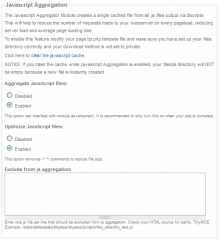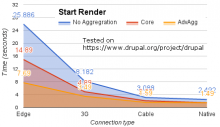Add functionality and customize your Drupal application with thousands of projects contributed by our amazing community.
A module is code that extends Drupal's by altering existing functionality or adding new features. You can use modules contributed by others or create your own. Learn more about creating and using Drupal modules.
As the Views and Views Calc modules rely on the database to perform aggregation, you only have limited options at your disposal.
As the great Merlin himself said: "You can't aggregate a PHP expression in the database. :/ ".
That's where Views Aggregator Plus comes in. In addition to what Views and Views Calc do, this module:
- enumerates group members
- produces tallies, i.e. textual histograms
- aggregates on Views PHP code-snippet evalutations
- can filter out result rows on regexp patterns
- gives you sorting on Views' Math expressions
- can process Webform submissions
- lets you add your own custom aggregation functions
... and it puts summary statistics at the bottom of your aggregated table as well!
Overview
Aggregator is the module that was in Drupal core until Drupal 10.0.
It was deprecated in Drupal core 9.4 and moved to contrib.
The aim of the JavaScript Aggregator module is to improve performance of your site with less server requests and bandwidth per page. In Drupal 5, all the JavaScript files will be aggregated into one file and optionally minified. JavaScript aggregation was brought into core with Drupal 6, so the Drupal 6 version of this module goes one step further to minify that file.
It basically does the following:
- Takes the $scripts variable and removes .js files using a regular expression
- Generates a unique filename for any set of .js files
- Creates and caches one file containing all .js files in files/js
- Optionally minifies the JavaScript using JSMin
- Returns a modified $scripts variable with link to cached file
A simple aggregation module for Drupal 7 that reduces the number of aggregated files by:
This module requires PHP 5 and CURL support. The Image module is required if you are planning on aggregating from feeds that contain an image per item. Always remember to run update.php when upgrading your module and always remember to BACKUP FIRST!
This module aggregates content from XML feeds. RSS 2.0, ATOM 1.0 & RDF 1.0 are supported, but its architecture is easily expandable to support any XML format, check out the README file for details. Following are some of its features :
- Highly efficient. This module was created for performance.
- Ability to assign term(s) to all items generated from a feed.
- Ability to dynamically tag all incoming items during feed handling phase. For example, RSS, ATOM & RDF categories are automatically extracted, added as terms, and auto-attached to aggregated items.
- Integrates with OG. If the feed is set as a group, all items are assigned as posts under it (parent->child). If the feed is set as a post, all items are assigned as posts under the feed's group (siblings).
- Built-in support for handling feeds that require HTTP authentication.
- Built-in support for handling feeds that require FTP authentication.
Summary
Note: AdvAgg needs a major rework for Drupal 10.1 - recommend holding update or disabling AdvAgg until a new release comes out.
This module provides grouping of styles in a single tag within the page header.
Helper module to add GROUP_CONCAT aggregate function.
This module provide the domain wise setting for the aggregation and compression of css and js files when we use domain module of drupal.It is useful when someone using multidomain website.
Introduction
This module is reated for helping keep your site clean of errors and notices.
Some drupal sites has one error that is repeat very frecuently so you can't see
Drupal 6 version
This packages two modules together:
Update status aggregator client
Gathers data about the modules and themes installed on a Drupal site and sends them to a corresponding server. As you are (hopefully) monitoring the status of the site from the server, optionally you can disable the 'There are security updates pending for your site' shown on the admin pages also.
Update status aggregator server
Receives data from clients and stores the data in the database and processes it to compute the latest updates available for the modules and themes. The data is exposed to views, so you can process it in almost any way you like.
Currently the module doesn't ship with any default views, but that will change soon!
Requirements
- Services module for the server component/site only
Drupal 5 version
Update status aggregator is comprised of two components: a "client" module and a "server" module.
The client (update_status_notifier.module), to be enabled on all sites that are to report to the central tracker, sends a list of installed modules and their status to the tracking site via xmlrpc when cron is run. This information is taken from the update status module.
This module provides a block to display a list of titles of recent articles from a feed created by the Aggregation module. A block may be created for each feed you have defined. Please note: this module will work only with feeds created by the Aggregation module.
A Feed Aggregator to syndicate items using tags/categories as filters.
Aggregates a user's profile nodes into one.
You have several different pieces of profile information about your users regarding to their work, eating habits, leisure time, and so on, all of which are considered to be semi-private (ie. may be hidden from eg. unauthenticated users). You may want to make (some part of) their profile data merged into one node per user, possibly with some considerably different layout and/or access control. You have set up different content types: 'work', 'eating', 'leisure', and 'public_profile', all of them set up with Content Profile module--but how to merge the first three into the fourth?
Here comes profile_aggregator.module handy. Just select the source profiles ('work', 'eating' and 'leisure'), select the target profile ('public_profile') with the appropriate format, and let the users update their pieces of profile information while having Drupal do the merge part of the work!
Description
This module will capture and aggregate user session data in order to provide the following:
- Elapsed Time: total time a user has spent on the site
- Session Count: total number of unique sessions for a user
- Date: A time stamp since the data started being collected
Dependencies
These modules are a requirement because they help to keep clean session data. Its highly recommended to limit the sessions to 1 per user.
How it works
When a user logs in, the session count field is incremented for a user and their session id and creation time are saved for later use. When the user is logged out, the session's time span is added to the user's elapsed time.
A module to create individual aggregator for Organic Groups using Aggregator.
A modification of the News Aggregator to show categorized feeds from multiple sources on 1 page. Example uses: 1.
Description
A RSS/XML aggregation utility that creates both teaser and story nodes based upon content from the feeds
Based on the core aggregator module, makes it possible to "promote" hand-picked items to nodes of the admin's choosing. There are numerous fine node based aggregator modules.
This module allows you to search multiple OpenSearch feeds at the same time. The results are aggregated and cached locally, and results are fetched incrementally as you page further down the results.
It works best if the search sources are all run on the same software. The OpenSearch module for Drupal can provide the appropriate feeds, and will also pass along relevance information. OpenSearch Aggregator will sort the results by descending relevance globally.
This project will provide a simple but extensible API for aggregation that ships in a configuration that covers the most common use case of aggregating feeds as nodes on a web site.
NOTE: This module is replaced by the FeedParser package.
Pages
 Support for Drupal 7 is ending on 5 January 2025—it’s time to migrate to Drupal 10! Learn about the many benefits of Drupal 10 and find migration tools in our resource center.
Support for Drupal 7 is ending on 5 January 2025—it’s time to migrate to Drupal 10! Learn about the many benefits of Drupal 10 and find migration tools in our resource center.

